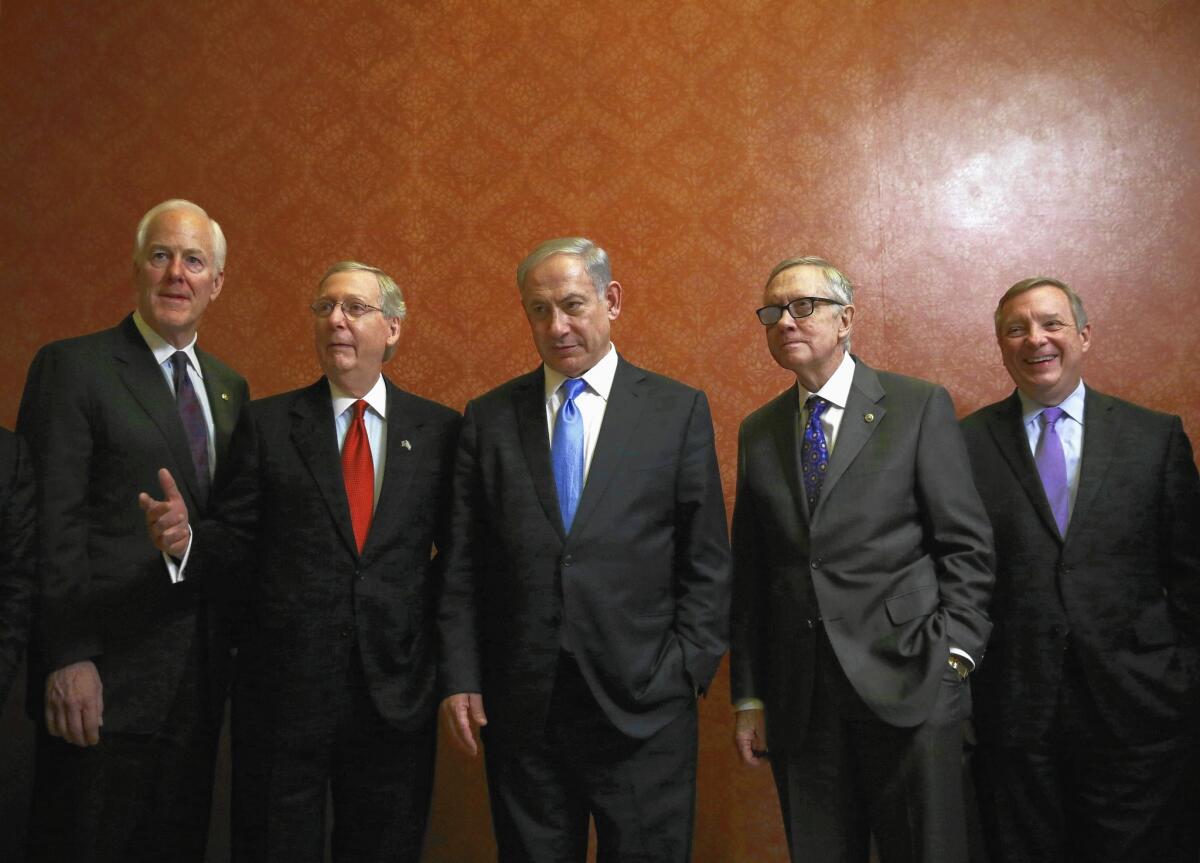Israeli premier’s speech lays out his differences with Obama on Iran

- Share via
Reporting from Washington — Israeli Prime Minister Benjamin Netanyahu’s speech to Congress on Tuesday laid out, in the starkest terms yet, his differences with the Obama administration on how to deal with the threat of Iran’s nuclear program.
Netanyahu denounced the nuclear deal under negotiation, insisting that it would make it easier for Iran to build a weapon. “It doesn’t block Iran’s path to the bomb,” he declared. “It paves Iran’s path to the bomb.”
President Obama was just as blunt — but in the opposite direction. The deal under consideration would “cut off the different pathways” for Iran to get to a nuclear weapon, the president told reporters after the Israeli leader’s speech.
Although Netanyahu opposes the deal the White House is attempting to broker, the president said, he “didn’t offer any viable alternatives.”
The back and forth brought into sharp relief the dispute that has grown between the Obama administration and Netanyahu over how to deal with Iran, and the broader rift that has developed between the two leaders over the last six years.
Netanyahu “basically went point by point to rebut” the arguments that Obama and his national security advisor, Susan Rice, have made this week, said Dan Arbell, a former Israeli diplomat now at American University in Washington. “He contradicted them on everything.”
Obama insisted that the agreement under discussion would subject Iran “to the most vigorous inspections and verifications regime that have ever been put in place.”
Netanyahu, however, said such monitoring has little value because world powers probably wouldn’t punish Iran if United Nations nuclear inspectors were to catch the country cheating.
Obama also warned that failure to reach a deal could open the way to a new Middle East war.
But Netanyahu argued that an accord would create a richer, nuclear-armed Iran with an appetite for aggression. And other nations in the region, he said, would race to build a bomb.
“It won’t be a farewell to arms,” the prime minister said. “It will be a farewell to arms control.”
Both leaders said America and Israel agree that they will not permit Iran to get a bomb, but they fundamentally disagree on how to reach that objective.
Whereas the White House and five other nations have sought a compromise with Iran, Netanyahu has insisted that the world powers abandon the talks and ratchet up economic sanctions until Iran caves on everything, surrendering all its nuclear infrastructure, ending regional aggression and halting its threats to Israel.
Administration officials say that isn’t feasible. Even getting Iran to give up its uranium enrichment isn’t realistic, they argue.
“No one can make Iran unlearn the scientific and nuclear expertise it already possesses,” Rice said Monday at the annual conference of the American Israel Public Affairs Committee, the pro-Israel lobbying group.
Administration officials argue that adding more sanctions on Iran, as Netanyahu urged, won’t force Tehran to back down, any more than previous sanctions have done.
“We have evidence from the past decade that sanctions are not sufficient to prevent Iran from pursuing its nuclear ambitions,” Obama said.
And launching airstrikes against Iran’s nuclear facilities, according to the administration, might temporarily set back the program but would probably only increase Tehran’s determination to clandestinely build a bomb, while ending international monitoring and verification efforts.
If negotiations succeed, Obama said, they would extend the so-called breakout time Iran would require to enrich enough uranium to fuel a single bomb from a few months, where it’s estimated to be now, to a full year, giving the international community time to intervene.
No one knows whether Iran would adhere to its commitments if an accord is signed. But Obama argued that intrusive inspections of Iranian facilities would uncover any illicit enrichment or other noncompliance.
Once again, though, Netanyahu took issue with that reasoning. He said such monitoring has little value, noting that world powers didn’t take action to stop North Korea when it ignored U.N. inspectors and built a nuclear device in 2006.
“Inspectors document violations; they don’t stop them,” Netanyahu said.
More to Read
Sign up for Essential California
The most important California stories and recommendations in your inbox every morning.
You may occasionally receive promotional content from the Los Angeles Times.














